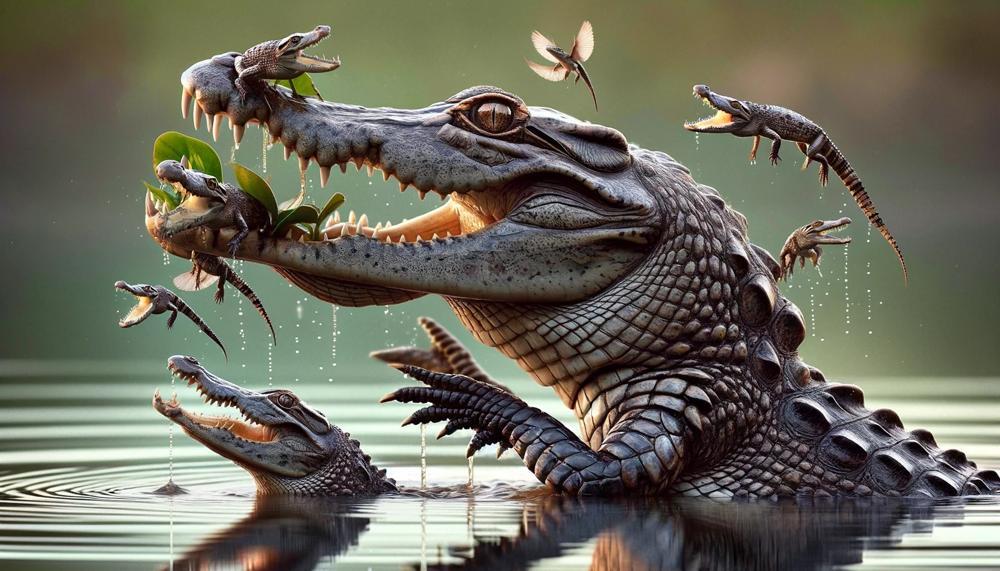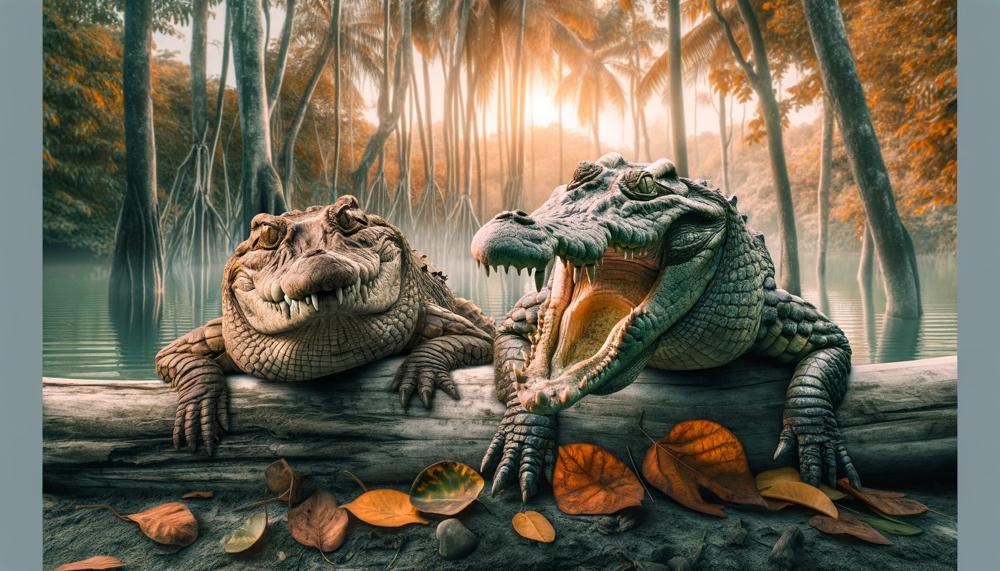Did you know that these ancient reptiles, which have been around since the time of the dinosaurs, possess such remarkable resilience and longevity that it prompts us to question our understanding of aging in the animal kingdom? This intriguing topic forms the heart of our exploration today, as we dive into the captivating world of crocodiles and their lifespans.
So, can crocodiles die of old age?
Crocodiles are known for their long lifespans. In the wild, they can live up to 70 years, with the Saltwater crocodile being the longest-living species. The average lifespan of all crocodile species is at least 30–40 years, and in the case of larger species an average of 60–70 years.
Interestingly, it’s been suggested that crocodiles might not die of old age. Instead, they die due to diseases, accidents, predation, or starvation. As they grow older, they become weaker and may not be able to hunt effectively, which can lead to starvation. Also, like all animals, they are susceptible to diseases and parasites that can lead to their death.
However, more research is needed to fully understand the aging process in crocodiles. They are a species that has existed on the earth for hundreds of millions of years, and they are still quite mysterious to us.
Let’s embark on this fascinating expedition together.
Contents
Do Crocodiles Age?
Crocodiles, those ancient predators that have roamed the Earth for millions of years, carry within them secrets to longevity that bewilder and fascinate. They do indeed age, but their journey through time is not like ours.
Let’s delve into the crux of how the aging process affects these formidable creatures and whether they can succumb to the sands of time.
| Aspect of Aging | Impact on Crocodiles | Can They Die of Old Age? |
| Negligible Senescence | Cells deteriorate at a snail’s pace, leading to a very slow aging process. This means crocodiles maintain vitality and physical prowess longer than many other species. | Yes, but it’s a gradual journey, marked by decreasing physical fitness, loss of teeth, and reduced fertility over time. |
| Physical Signs of Aging | While they age slowly, signs do appear such as the loss of teeth and a decline in fertility. However, these signs are more subtle compared to other creatures. | Indeed, these ancient beings are not immune to the effects of time and can pass away from age-related complications. |
| Lifespan | Crocodiles can live for many decades, with records of Nile crocodiles reaching 121 years. Their long lives allow them to dominate their habitats as apex predators. | Despite their formidable nature and anti-aging attributes, crocodiles do not escape death by old age, even if it comes much later than it does for many species. |
| Survival in the Wild vs. Captivity | While in the wild, older, weaker crocodiles may fall prey to predators or other dangers before reaching old age, in captivity, they often live to their full lifespan potential. | Yes, in the absence of external threats, crocodiles in captivity show us that they can indeed die of old age. |
Crocodiles’ longevity and their journey through life are as enigmatic as the creatures themselves. They’re a testament to the resilience and adaptability of nature.
Though they carry the essence of primeval times within them, crocodiles do age and can ultimately succumb to the wear and tear of time.
Do Alligators Age?
Alligators, those formidable beasts that seem to bridge the gap between the prehistoric and the present, indeed age, albeit with a resilience that’s the stuff of legend.
To delve into the nitty-gritty, let’s break down their lifespan and the zenith of age they might attain.
Typical Lifespan of Alligators:
| Environment | Average Lifespan | Recorded Maximum Age |
|---|---|---|
| Wild | 30-50 years | Over 80 years |
| Captivity | Up to 70 years | Over 85 years |
Are Crocodiles Immortal?
Crocodiles aren’t immortal, but they’ve got some nifty tricks that might make you think they are. These ancient critters, surviving through aeons, have features that smack of tales more than science.
But let’s get the facts straight.
Lifespan and Aging
Crocodiles, like the old souls they are, live a darn long time. Some of these reptiles kick around for a century, which, in the animal kingdom, is pretty rare outside storybooks.
They age slower than your grandma’s Sunday drive, making them seem like they’ve found the fountain of youth.
Regeneration: Nature’s Repair Kit
Here’s something that’ll grab your attention: crocodiles can spruce up their bodies like nobody’s business. Lost a tooth? No sweat, another will come to the party. This bit of biological wizardry adds to their tough-as-nails image.
Table: Crocodile Features vs. Immortal Myth
| Feature | Description | Relation to Immortality |
| Longevity | Lives up to 100 years | Creates perception of enduring life |
| Regeneration | Can regrow teeth and heal wounds | Mirrors mythological regeneration abilities |
| Resilience | Survives in harsh conditions | Embodies the mythical survival trait |
Survival of the Slickest
Crocodiles are the Houdinis of the animal world, escaping from the tightest spots. Harsh environments? They shrug it off. No water? They’ll wait it out. This survival skill has folks whispering about immortality.
In the flesh and blood world, though, crocodiles aren’t skipping the mortal coil. They live long, mend well, and endure like legends, but eventually, they do check out, just like the rest of us.
Are Alligators Immortal?
Alligators, while shrouded in myths of enduring lifetimes, indeed embrace a natural lifecycle that culminates with age. Despite the tales and whispers of their seemingly endless existence, these formidable creatures tread through a journey that, albeit longer than many other beings, finds its closure within the realms of the natural world.
They grow continuously, their size a testament to their years, yet they are not exempt from the finality that time imposes on all living entities.
Key Insights on Alligator Longevity
Alligators boast remarkable resilience and possess capabilities that allow them to thrive across decades, yet they are bound by the same cycle of life that governs us all. Their longevity can be attributed to several factors, including their slow metabolism and the ability to grow throughout their lives.
However, the concept of immortality in alligators is a blend of myth and misunderstanding.
Here’s a table summarizing the aspects of alligator longevity:
| Aspect | Description | Impact on Longevity |
| Growth | Alligators grow continuously. | Contributes to their perceived longevity but does not equate to immortality. |
| Metabolism | Slow metabolism. | Slows down aging process, leading to longer lifespans. |
| Environment | Dependency on external factors like food availability and habitat safety. | External threats can curtail their lifespan despite biological resilience. |
In essence, alligators, with their grandeur and might, navigate through life with a pace and resilience that’s both admirable and enviable. Yet, they too, in the end, yield to the passage of time. The reality is, alligators do face the inevitability of old age and the natural decline that comes with it.
Disease, scarcity of food, and habitat challenges are but a few hurdles that they face, which can ultimately lead to their demise.
What is the Oldest Alligator?
Alligators, those formidable beasts with their armored bodies and toothy grins, are not just survivors of a bygone era; they are thriving relics that whisper tales of ancient Earth. In the realm of longevity, these creatures are especially remarkable. Typically, an alligator’s lifespan spans between 30 to 50 years in the wild.
However, in more controlled environments like zoos, where threats are minimal and meals are assured, these reptiles can surpass the usual bounds of age.
The record for the oldest alligator is held by Muja, a venerable beast residing at Belgrade Zoo in Serbia. Muja has been at the zoo since the early 1930s, making him the senior citizen of the alligator world at an impressive age of over 85 years. This makes Muja not just an outlier but a sensational example of alligator longevity.
| Alligator Name | Location | Recorded Age |
| Muja | Belgrade Zoo, Serbia | 85+ years |
| Average Wild Alligator | Southeast USA | 30-50 years |
| Average Captive Alligator | Zoos globally | 50-70 years |
Muja’s exceptional age is a testament to the robustness of alligators and the care provided in zoological settings. It also highlights the impact of a secure environment free from predators and the constant availability of food on the lifespan of these ancient reptiles.
While the thought of a giant reptile pushing past eight decades might seem a yarn spun for the silver screen, Muja’s life is well-documented and celebrated, illustrating not just survival but the thriving of a species that has seen dinosaurs come and go.
What is the Oldest Crocodile?
Crocodiles, those tenacious survivors from the prehistoric era, have fascinated us with their longevity. When it comes to the oldest crocodile, we look towards “Cassius,” a fierce and resilient Saltwater Crocodile.
Living in Marineland Melanesia, Australia, Cassius holds the record at an astounding 110 years, as of my last update.
Lifespan of Crocodiles
| Species | Average Lifespan (in the wild) | Recorded Age (in Captivity) |
| Saltwater Crocodile | 70 years | 110 years (Cassius) |
| Nile Crocodile | 70-100 years | Not precisely recorded |
| American Crocodile | 60-70 years | Approximately 80 years |
Crocodiles, thanks to their robust anatomy and predatory mastery, can live up to 75 years in the wild. In more controlled environments like zoos, they’ve been known to surpass the 100-year mark.
The Saltwater Crocodile, specifically, showcases remarkable anti-aging traits, often referred to as a living fossil.
Survival in the Wild
In the wild, crocodiles face a myriad of challenges. Only a tiny fraction of hatchlings reach maturity, owing to predators and environmental factors. As they grow older, even these mighty beasts aren’t immune to the trials of life.
Aging crocodiles may struggle with tooth loss, cataracts, and threats like poaching and habitat degradation.
Crocodile Species and Habitats
These ancient creatures come in 14 species, adapting to various habitats. The petite Dwarf Crocodile barely reaches 4.9 feet, while the Saltwater Crocodile can grow to a staggering 23 feet.
They primarily inhabit tropical climates, with semi-aquatic lifestyles, making the most of their surroundings.

Final Thoughts
While Cassius stands as a testament to their impressive lifespan, every crocodile, from the Nile to the American species, demonstrates a remarkable ability to endure and adapt in a world that’s constantly changing around them.
Why is There a Myth that Crocs and Alligators Don’t Age?
The belief that crocodiles and alligators do not age—technically termed “negligible senescence”—stems from their unique aging process.
Unlike mammals, which show clear signs of aging and a steady decline in physical capabilities, crocodiles and alligators maintain a robust vitality throughout their lives, rarely manifesting external signs of aging.
This remarkable trait has sowed seeds of the myth that these creatures are virtually immortal in terms of aging.
Scientific Insights
Contrary to the mythical narrative, crocodiles and alligators do age but in a manner significantly different from humans and other mammals.
| Feature | Description | Impact on Aging Perception |
| Negligible Senescence | The biological process where an organism shows no significant signs of aging, maintaining vitality and reproductive capacity into old age. | Leads to the belief that these animals do not age due to the absence of visible aging signs. |
| Longevity | Crocodiles and alligators have lifespans extending up to 75 years in the wild and over 100 years in captivity. | Enhances the myth, as their lengthy lifespan compared to many other species suggests a delayed or absent aging process. |
| Continuous Growth | These reptiles grow all their lives; larger size often correlates with age. | Misinterpreted as a sign of perpetual youth and vitality. |
Cultural Perceptions
The myth is further amplified by cultural stories and the impressive survival skills of these animals. They are survivors of the age of dinosaurs, which adds a prehistoric mystique to their persona, often romanticized in folklore and media as living fossils who defy the ravages of time.
The Reality
While it’s true that crocodiles and alligators experience negligible senescence, implying a very slow and reduced rate of aging, they are not exempt from the natural lifecycle. They do indeed age, but without the typical deterioration associated with it in mammals. Their death is usually the result of external factors such as disease, injuries, or environmental changes rather than old age itself.
This unique biological feature of crocodilians challenges our conventional view of aging and longevity, leading to misconceptions and myths about their eternal youth.
Conclusion
In our quest to clear up the mystery of how long crocodiles live, we’ve explored the worlds of science and myth to find the facts about these old animals’ lives. Crocodiles, those ancient animals that have seen eons pass, do age.
We don’t usually think about the last few years of life as being tough or graceful, but their amazing journey through time shows that they are strong and graceful as they age. With almost no senescence, crocodiles age very slowly, which helps them stay strong and healthy for a much longer time than most other species.
Along with their amazing ability to grow new teeth and heal cuts quickly, this amazing trait helps them live very long, sometimes over a hundred years, in the right circumstances.
Crocodiles are very strong, but even they will eventually let time take hold. They do have problems getting older, but they do so much more slowly and with more grace than many of their human neighbors. The story that they can live forever is a myth, even though it is based on how well they survive. Still, the story makes us feel awe and respect for these old beasts and reminds us of the wonders and secrets of nature.
Thinking about how long crocodiles live and what that means for how we think about getting older makes us realize how complicated and varied life is on Earth. Crocodiles are like living fossils; they show how nature can change and last for a long time.






